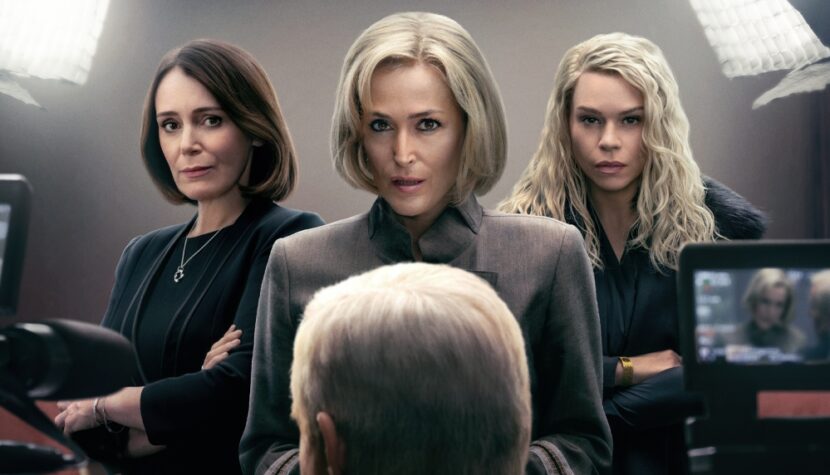SCOOP. Women Take Down Prince Andrew [REVIEW]

The last decade hasn’t been very kind to the British royal family. The increasing negative PR was fueled by the departure of its members, high-profile interviews and documentaries revealing the realities of life within the “blue-blooded family,” and of course, widely publicized scandals. This time, one of those scandals caught the attention of Netflix, which has specialized in British monarchy topics, delivering hits like The Crown and the six-part story of Harry and Meghan’s love. The latest project, centered around the crown, tells us the story of how the famous interview with Queen Elizabeth II’s beloved son, Prince Andrew, led to the complete collapse of his image and forced him to resign from his titles. This was due to his suspicious closeness to American financier Jeffrey Epstein, accused of rape, molestation, and trafficking of minors. Although Philip Martin’s Scoop seems to initially focus on examining morality within the British royal family, it’s really a story about the strength of women, the workings of professional international journalism, and how a series of unexpected events can rewrite history overnight.
Prince Not So Charming

Prince Andrew (Rufus Sewell) – the youngest, beloved son of Queen Elizabeth – becomes the center of a huge scandal when, in 2010, British paparazzo Jae Donnelly (Connor Swindells) photographs him in a park with Jeffrey Epstein, an American sexual offender. This scene opens Scoop, swiftly shifting a decade forward, just before the FBI raids Epstein’s home. Working for the BBC, Sam McAlister (Billie Piper) seizes the opportunity, using her connections at Buckingham Palace to secure an exclusive interview with Prince Andrew. For Andrew, this could be his last chance to salvage his image. However, everyone in the industry knows that the monarchy’s reputation is merely a façade – what truly matters is a strong theme, sensationalism, and showcasing to the nation, even the world, how vulnerable Andrew will appear against the fearless, fact-armed journalist Emily Maitlis (Gillian Anderson). The Newsnight team, a BBC program, now has one goal – to gain the trust of palace advisors and the prince himself to ultimately dismantle their perspective during this uncomfortable interview. We delve into the details of press investigations, uncovering deceit, hypocrisy, and an environment of “pretend we don’t know” surrounding Prince Andrew. Ultimately, the focus is on the power of contemporary journalism and its media impact, capable of reshaping the life’s work of one of Britain’s most famous figures (albeit at his own request).
Following the Thread

In both construction and tone, Scoop resembles titles like Spotlight, Hot Topic, or The Voice. These films all revolve around exposing the truth through high-profile journalism and extraordinary individuals. Sam McAlister embodies this in “The Strong Theme” – her persistence irritates colleagues, who criticize her for seeking sensation rather than quietly performing her duties. Despite this, her dedication pays off, forging a bond with Andrew’s assistant, Amanda Thirsk (Keeley Hawes), and ultimately with the prince himself, who admires her fearlessness in pursuit of her goals. Her commitment leads to a climactic moment: the infamous interview with Prince Andrew at Buckingham Palace. Completely relaxed and unaware of his public perception, Andrew unknowingly seals his fate and becomes a laughingstock in British public opinion. This is thanks to the team’s meticulous tactics and hours of preparation led primarily by women, challenging misogyny, patriarchy, and the impunity of privilege.
Journalism in a Nutshell
You might expect a Netflix film of such high anticipation in 2024 to be a true revelation about the British royal family, but Scoop falls short. While Emily and Sam’s work is groundbreaking, it sometimes lacks the necessary punch to fully captivate the audience. The script is dense and lacking pauses, yet fails to deliver extreme emotions or break out of conventional politeness. Dialogues between characters are shallow and predictable, begging for bolder scenes, especially utilizing the talent of the brilliant Gillian Anderson. The film’s zero-to-hero narrative diminishes its potential impact, reducing what could have been a bold political commentary to a diplomatic, static, and dreadfully dull presentation.
Women Topple the Monarch

The strongest aspect of Scoop lies in its robust female characters, almost becoming a separate entity within the story. Rufus Sewell’s performance as the awkward yet impeccably concealing Prince Andrew is notable. Billie Piper’s character, almost insufferable in her persistence, is equally impressive. The film showcases determined female characters on both the “light” and “dark” sides of power. Keeley Hawes also plays a mysterious, ambiguous role, shaping Andrew’s image while acknowledging his flaws. Martin’s film offers a glimpse into the work of modern PR professionals, turning even the most scandalous figure into a charismatic leader. Unfortunately, the film’s imagery remains within the boundaries of predictability, lacking tension that would keep the audience engaged. Even a short tea break won’t disrupt the narrative, as the film fails to leave a lasting impression or incite curiosity about the royal family’s concealed issues.
Will Scoop broaden your understanding of the British royal family’s functioning and clever problem concealment? Certainly not by revealing new, unknown facts or sparking in-depth dialogues with its dense dialogue and action-deprived plot. Nevertheless, it surprises with a few stellar performances and offers a glimpse into the workshop of contemporary journalism. Media emerges as a critical player – authentically depicted without embellishment. Ultimately, Scoop falls short of delivering the powerful impact it could have had, given the weight of the events it portrays.

